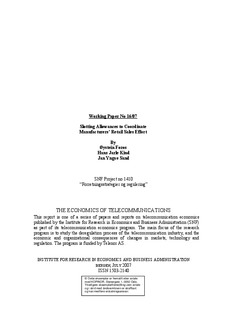Slotting allowances to coordinate manufacturers’ retail sales effort
Working paper

Åpne
Permanent lenke
http://hdl.handle.net/11250/166158Utgivelsesdato
2007-07Metadata
Vis full innførselSamlinger
- Working papers (SNF) [809]
Sammendrag
Slotting allowances are fees paid by manufacturers to get access to retailers’ shelf space. Although the main attention towards slotting allowances has been within the grocery industry, slotting allowances have also been applied within e.g. e-commerce and mobile telephony. In these industries we observe that distributors have large market power due to their control of access to customers. We analyse how shifting bargaining power from manufacturers to retailers and the use of slotting allowances affect consumers’ surplus and channel profit when the manufacturer undertakes non-contractible retail sales effort (through e.g. advertising, promotions and product quality control). We show that with a simple linear wholesale tariff consumers are better off if the retailer has the bargaining power than if it belongs to the manufacturer. With retail bargaining power a change from a linear wholesale tariff to slotting allowances harms the consumers and increases channel profit. As a consequence, the welfare effects of slotting allowances are ambiguous.
Utgiver
SNFSerie
Working paper2007:16